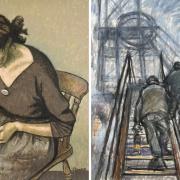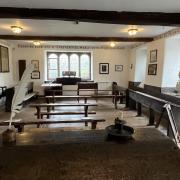Learning that 200,000 people saw Dear England across its two runs in London made me wonder what on earth I was doing to have missed it. I even managed to miss the National Theatre Live stream from the Olivier Theatre in January this year. Yep, finger on the pulse me.
So, when I saw the NT Live screening of a recorded stage performance was, for one night only, at Brewery Arts, in Kendal, this time I hotfooted it to the box office.
NT Live is a wonderful thing. As much as you might love a trip to London to see the latest West End show, shelling out the best part of £500 each time to travel and stay over can make it prohibitive, on cost if not time.
For many years now, NT Live has been bringing shows to a cinema near you. First, a live performance broadcast simultaneously in cinemas around the country followed up a few weeks later with screenings of the recorded show. In the case of Brewery Arts, it knocks your £500 down to £16.50 or less.
And it is not just Kendal. Or NT Live. Rheged recently brought 42nd Street, from the Theatre Royal, in its Big Screen Musical. The Alhambra Cinema, in Keswick, Zeffirellis, in Ambleside, and Vue cinemas in Barrow and Carlisle, along with Brewery Arts and Rheged, also have regular streams from Met Opera, the Royal Opera and the Royal Ballet. There are Exhibition on Screen showings too from venues like the National Gallery all of which means our local venues benefit from London events.
Back to Dear England. James Graham’s Olivier Award-winning play tells the story of unlikely hero Gareth Southgate’s appointment as England manager in 2016 and his subsequent efforts not just to end “30, 40, 50 years of hurt” and bring home another major trophy, but also to reunite a country and define what is England.
The unassuming former England player is bemused by the misguided anticipation and ceaseless demands for success that follow the team; the evidence in no way justifies the hope, but nevertheless, a country expects.
The players’ talent is not in doubt. Once Wayne Rooney is dispatched in favour of new blood, Southgate turns to psychology to rebuild team spirit and engender a new internal culture of love, not fear; where support begins at home and young men, some with challenged backgrounds, can be role models for a generation.

Joseph Fiennes’ portrayal of the compassionate and humble Southgate is uncanny, especially once he adopts the familiar waistcoat. With hands thrust in pockets or waved flat in gesture, held across his front or raised in double fist salute, it is a sensitively practised, nuanced imitation.
The challenge for Fiennes, perhaps, was growing the essentially quiet character into the stature of on-stage leading man, and this he achieves.
The source of the play’s title is a letter Southgate wrote to the country, but the stronger of Fiennes’ monologues comes as he emotionally recalls the moment that defined him as a player: that missed penalty against Germany in Euro96, and its aftermath, which is also the opening shot of the play.
Another of the production’s many strengths is the minimal set that sits beneath an arc of light reminiscent of the Wembley arch. Tall cubicles that work as dressing room booths, entry and exit points, as a scene divide on the revolving stage and even for projecting ‘It’s coming home’ graffiti are moved at breathtaking speed around the flat, circular stage.
Transferring football into the confines of theatre was never going to be easy, but Es Devlin’s design works brilliantly. The stage is both expansive during ‘training’ and match days, with strobe lighting to enhance the movement of players across the space, and intense when the pressure of expectation starts to close in. The use of freeze frame to capture players as if caught by the lenses of the press is inspired.
The stadium experience continues in the digital perimeter signage that delivers everything from match and tournament scores and statistics to 1966 World Cup footage.
Over it all hangs the threat of penalties, an ever-present future menace and an unshakeable weight from the past as both players and manager try to “write their own stories”.
As England reaches yet another dreaded shoot out, with a place in a final or semi at stake, the tension is palpable. As each penalty taker moves to strike, the coming together of boot and imaginary ball is replicated immaculately in Dan Balfour and Tom Gibbons’ sound design.
Sound is central to the show, from the cheering crowd recordings and match commentary to pop music from the era – inevitably New Order’s World in Motion and English football’s anthem Sweet Caroline.
Changes in team kit also represent time passing as each new competition comes along, Southgate eventually loosening up enough to ditch the waistcoat in favour of polo top and jacket.
At his shoulder is psychologist Dr Pippa Grange (Gina McKee) who knows nothing about football and is a woman in a man’s world but manages to navigate a path that is neither ‘one of the lads’ nor mother hen to the young players.
A level of sexism is touched upon, but the point isn’t laboured; instead the bigger focus is on the racism experienced by players like Marcus Rashford (Darragh Hand) and Jadon Sancho (Albert Magashi), but it still feels a bit like lip service.
The controversial decision for players to ‘take the knee’ is set against a political backdrop that includes Brexit, and Covid,
Directed by Rupert Goold, the squad of young actors are a strong team, the pick being Josh Barrow as Jordan Pickford (though he could have got away with even more of the goalkeeper’s hyperactivity) and Will Close. He provides much of the early comedy at the expense of his alter ago Harry Kane, becoming less of a target of the jokes as his character matures into the team captaincy. The audience’s mirth turns to guilt as he reflects on his suffering from the mockery by the public and press, while the shared experience of his own missed penalty brings him and Southgate even closer.
Early antagonism between players sees them come together, lifting one another in spirit and, to great effect, physically to reach those high balls.
And this is where the play’s lasting impact lies, in the characters and their likability. It means you don’t need to love football to get the story and appreciate the real life pressures of professional sport, although it stops short of chancing any real insight to the men.

The audience cannot help but become fans, however, as the manager sits in despair at the edge of the stage. And of course we all join in with Sweet Caroline, whether live or in the cinema months later.
Sean Gilder’s comedic portray of Sam Allardyce and more is the pick of the supporting cast.
The inclusion of Boris Johnson (Gunnar Cauthery) and an unconvincing Theresa May (Crystal Condie) adds little; Gary Lineker and footballer-turned-broadcaster Alex Scott, played by the same, also make appearances.
Despite all that is admirable about NT Live, it will never come with the atmosphere of being in an auditorium with the cast a few feet away from you.
But there are some aspects that are better – the zoom function on the camera for instance, which shows you the whites of the eyes of the actors that you can never see from row Q in the dress circle. In this case, the wide angle view you get in the cinema ensures you don’t miss a thing, which can be an audience disadvantage of thrust staging.
The story ends in 2022, with the next chapter, this summer’s Euros 2024, yet to be written. While the expectation will be as high as ever, at least some of us might look on with a bit more sympathy.
* Later this month winner of the Olivier Award for best actor, Mark Gatiss, in The Motive and the Cue and dance-theatre show Message in a Bottle are coming up from NT Live in Cumbria. Check the different venues mentioned for dates and times, and you need never miss a show again.








![The beaver and kit spotted at Lowther [Lowther-Estate]](/resources/images/128x89/1x/18601737.jpg)
![The beaver and kit spotted at Lowther [Lowther-Estate]](/resources/images/180x180/1x/18601737.jpg)


![Julie Carter [Jessie Leong]](/resources/images/128x89/1x/18534684.jpg)
![Julie Carter [Jessie Leong]](/resources/images/180x180/1x/18534684.jpg)














